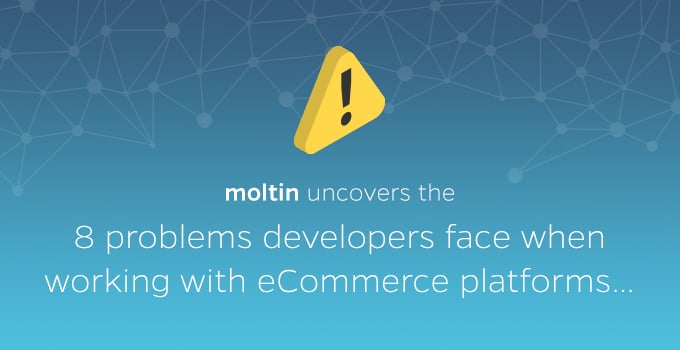One of the most important decisions to make when building an online store is choosing what eCommerce platform to use. At moltin, after years of experience and frustrations working with existing eCommerce platforms, we highlighted the problems we discovered and decided to create a solution that gives developers the complete eCommerce experience they’ve been looking for.
Here are the main eight reasons we think building eCommerce apps and websites can become complicated and tiresome projects:
1. Inflexibility
Both downloaded and cloud-based platforms can be inflexible – often restricting you to building for certain devices, only using particular languages or even restricting you to use their logic, forcing templating languages onto you.
2. Third party add-ons
With inflexibility comes the need of often having to rely on adding third-party plug-ins or add-ons to quickly add out-of-the-box features your site needs. This often causes problems later on when you have to patch and maintain these regularly or fix problems associated with them due to their unreliable quality.
3. Custom logic
It’s likely that most platforms (and their add-ons) will provide you with 90% of the features you need, however, there’s probably around 10% that needs to be custom, depending on the individual store and business requirements. Custom and non-standardized eCommerce logic can be very difficult to weave and add into existing eCommerce platforms.
4. Complexity
Many of them may have lots of documentation, resources, developer groups etc. however, they’re often still complex to use. You’re expected to handle everything; from the servers, databases, back-end and front-end of the store, which takes your focus away from just creating a great customer experience.
5. Long learning curves
With their complex, unwieldy codebases and tutorials and forums largely focusing on fixing problems rather than detailing how to use the product itself and implement features, it can be difficult to get your head around some platforms. This mean it can take months to fully get up to speed with how they work and the further you delve into using the product, the more problems you tend to face.
6. Constant maintenance
Downloaded platforms need to be regularly maintained and updated with security patches, meaning simple updates can become a minefield of time, resource, and money. Issues are compounded when trying to maintain different versions and add-ons.
7. Restricted creativity
Many platforms use a ‘cookie-cutter’ approach limiting you to design themes and rigid templates, which in turn creates inflexible, standardized sites. Marketplaces do offer alternative themes and templates however you have to unpick how these have been created and don’t get an insight into the decisions made behind these.
8. Server and hosting issues
Some smaller eCommerce websites can be placed on shared costing, but spikes in traffic can often cause box issues. For the average eCommerce site, you generally have to look at running on a VPS or a hybrid server, possibly. However some platforms are greedy and eat servers for breakfast, lunch and dinner, meaning you couldn’t run on cost-effective shared hosting, and even paying for bigger hybrid servers still results in reaching the limits of its capabilities, specifically for larger stores.
The bottom line
Some platforms market themselves as being ‘free’ – the platform itself may be free to download and they won’t have any upfront costs but the complexity of building on and learning how to use the platform costly from a development and training point of view. Developers often have to invest a great deal of time, energy and resources to learn how the platform works, and don’t forget about the cost of plug-ins and add-ons you may have to purchase on top of the ‘free’ platform.
Moltin’s approach…
After years of experiencing these problems ourselves, it became our mission to solve the headaches developers were facing. We wanted to provide the customization and flexibility of downloaded solutions with the speed and ease of use that cloud-based platforms provide and therefore turned to something different; the API driven approach.
moltin is a cloud-based eCommerce solution that takes every action you would typically find inside an eCommerce platform and turns it into an API call, this includes APIs for eCommerce functionality such as inventory, shopping carts, checkout flow, payments and more.
Learn more about moltin and sign up for free here.








